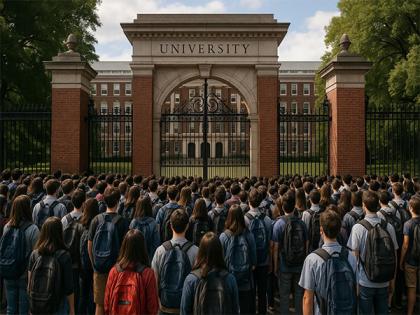US Undergraduate Admissions in 2025-26: Challenges & Opportunities
By ANI | Updated: May 21, 2025 11:37 IST2025-05-21T11:31:35+5:302025-05-21T11:37:53+5:30
VMPL New Delhi [India], May 21: The landscape of US undergraduate admissions in 2025 is more competitive, complex, and ...

US Undergraduate Admissions in 2025-26: Challenges & Opportunities
VMPL
New Delhi [India], May 21: The landscape of US undergraduate admissions in 2025 is more competitive, complex, and stressful than ever before. Students, parents, and educators are navigating a system marked by record application volumes, evolving admissions criteria, and mounting financial pressures-all of which are shaping the outlook for 2026 and beyond.
Rising Application Volumes and Intensified Competition
This year, the number of college applications has surged yet again. The Class of 2025 submitted over 8 million applications through the Common App, a 6% increase from last year, with schools like NYU experiencing a staggering 53% rise in applications over five years. Public universities, especially in the South and Southwest, are seeing the sharpest growth, making even these options increasingly competitive. For example, Columbia University received nearly 60,000 applications for fewer than 2,500 spots. This phenomenon, known as "application inflation," is creating unpredictable outcomes, even for high-achieving students.
The Early Decision Advantage
Applying early has become a strategic necessity. Many top universities now fill over half their incoming class through Early Decision or Early Action rounds. The advantage is clear: Emory admitted 28% of Early Decision applicants in 2025, compared to just 8% in Regular Decision. This trend pressures students to make binding choices earlier and can disadvantage those needing to compare financial aid offers.
Holistic Admissions and the Decline of Standardized Testing
US universities are increasingly adopting holistic admissions, placing greater emphasis on essays, extracurriculars, and personal stories rather than just grades and test scores. The test-optional movement, accelerated by the pandemic, remains strong in 2025, with many schools no longer requiring SAT or ACT scores. As Caroline Linger, Lead Counselor at IvyCentral.com, explains, "A holistic approach that considers an applicant's character, personal experiences, and unique perspectives is gaining prominence. Technology, especially Artificial Intelligence, is playing a significant role, making the admissions process more accessible and efficient. Aspiring students must adapt to these changes, emphasizing authenticity, personal growth, and community contribution for a successful application".
Financial Pressures and Parental Concerns
The cost of college remains a top concern. According to a 2025 Princeton Review survey, 98% of those surveyed report needing financial aid, and the leading worry for applicants is the "level of debt to pay for the degree". This financial anxiety is compounded by the unpredictability of admissions outcomes and the fear of not gaining entry to a Top Tier University or College.
Stress and Uncertainty for All Stakeholders
The emotional toll is significant: 73% of students and parents report high stress about applications. The unpredictability of results, the pressure to stand out in a crowded field, and the need for strategic planning are pushing families to seek expert guidance and comprehensive support.
Looking Ahead to 2026
As the number of high school graduates is projected to decline after 2025, competition for spots at selective institutions is expected to remain fierce, but some less-selective schools may struggle with enrollment. The continued evolution of holistic admissions and the use of technology will further change how applicants are evaluated. For students and families, the key will be adaptability, authenticity, and a well-researched, balanced college list.
In 2025, U.S. undergraduate admissions are marked by unprecedented competition, evolving evaluation standards, and growing financial pressures. Caroline Linger of IvyCentral.com advises, "To succeed in 2026, students must apply to more universities than ever before, and high school counselors should remove any limits on application numbers." This guidance will be increasingly critical for the class of 2026 and future applicants.
(ADVERTORIAL DISCLAIMER: The above press release has been provided by VMPL.will not be responsible in any way for the content of the same)
Disclaimer: This post has been auto-published from an agency feed without any modifications to the text and has not been reviewed by an editor
Open in app